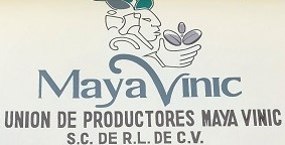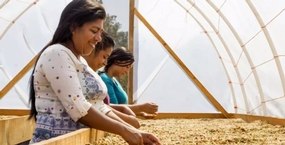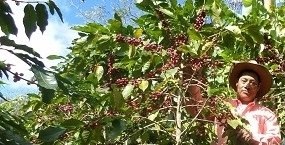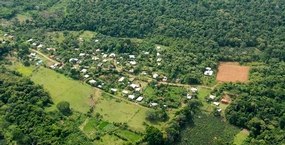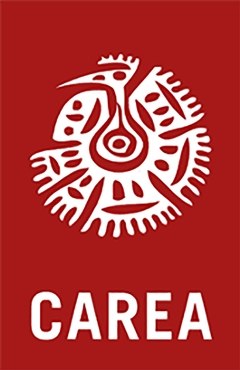Cooperative Red EcolSierra
The Red EcolSierra cooperative is situated in the Sierra Nevada de Santa Marta region in Colombia. For generations, indigenous and other population groups have been cultivating coffee collectively in this highland region.
Red EcolSierra coop has been established in 1997 by a network of ecologically-oriented small-scale farmers. Since 2014, the coop is capable of exporting coffee and is featuring an uninterrupted processing chain. Red EcolSierra is organic-certified and is acting according to fair principles in the spirit of solidarity.
These principles are put into practice by improving the living conditions of small-scale farmers. There are 425 families in 23 groups being distributed across four regions (Santa Marta, Ciénaga, Aracataca and Fundación). The head office, a warehouse and the coop's coffee laboratory are located in Santa Marta. The employment of agricultural technicians is providing for vocational training of members and high coffee quality.
Civil war, strikes and protest movements in Colombia
Colombia is one of the biggest countries at Central America's border. Corruption, civil war, organised crime and a militarised war are having a massive impact on the country and its population. At the same time, there are strong strike movements and social protests all over the country.
In February 2013, small-scale farmers went on a general unlimited strike across the country. Their demands included fair and stable producers' prices, reduction of their debts at Colombia's agricultural bank as well as a ban on mega-mining projects. During blockades of Panamericana, the most important road in Central and South America, one person has been killed, several have been hurt or are missing.
Exploitation of Colombia's abundant resources is constantly giving rise to conflicts. German and international corporations are realising billions of profit. The dirty local work is done by right-wing para-military forces featuring connections to state police and the military. In order to enforce coal mining projects, severe violations of human rights are committed. The local population and small-scale farmers are displaced violently, the rain forest is destroyed. Groundwater and essential rivers are polluted during the coal-cleaning process.
Coal-fired power station's international logistics – e.g. the coal being subsequently delivered to controversial power stations like Moorburg in Hamburg – has encouraged an intertwining of urban climate protests with indigenous population groups' blockades and workers' strikes in Colombia. On the other hand, many people have been killed as a consequence of protests and social movements, including more than 20 union members.
Small-scale farmers' highly-contested land
Red EcolSierra cooperative, like many others, has been established on contested land. In the seventies, armed forces for the protection of major landowners had been created in the region. Small-scale farmers were threatened by these para-military forces and activities of the military during the eighties and nineties' civil war. Massive displacement was taking place as a consequence of fighting and selective assassinations. The region has been the focus of armed conflicts and of crucial relevance to organised crime due to its proximity to Santa Maria harbour. It presented a natural corridor connecting regions and developed into a hiding place for drugs, weapons and contraband.
Since 2006, families without legal protection have started to return to their land and to organise in cooperatives. Para-military forces had been neglecting the coffee plantations for years and parts of the forest had been devastated by illegal deforestation.
More information:
https://www.ecolsierra.com/notired.html
